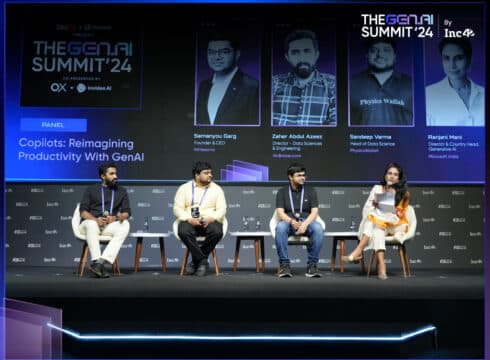During a panel discussion at Inc42’s GenAI Summit, business leaders discussed the ways AI copilots are driving efficiency and their impact on various sectors
Sanndeep Varma of PhysicWallah explained how the edtech major utilises copilot to generate accurate student content and streamline internal operations
NoBroker.com’s Zaher Abdul Azeez addressed the issue of security and stressed the importance of compliance for AI systems in sectors like finance and healthcare
Inc42 Daily Brief
Stay Ahead With Daily News & Analysis on India’s Tech & Startup Economy
Generative AI (GenAI) has rapidly permeated workplaces and its adoption has evolved from initial hesitancy to acceptance. With this shift, business leaders are now focussing on maximising organisational productivity through GenAI. While research to quantify its impact is still in early stages, leaders across startups and enterprises are actively leveraging GenAI to streamline operations across departments.
An EY report released in January 2024 used case studies to showcase GenAI’s productivity boost across segments. It highlighted how customer service agents equipped with GenAI-powered conversational assistants resolved 13.8% more customer inquiries per hour compared to those without it. Additionally, professionals like marketers, HR specialists, consultants and data analysts are able to complete a task 40% faster with GenAI, the report suggested.
The accessibility of efficiency-enhancing GenAI tools is on the rise with solutions like ChatGPT and Gemini (formerly Bard) leading the way. Further, AI copilots of the likes of Microsoft and GitHub have elevated the game as they can access the internet for real-time information and provide source links.
For context, an AI copilot is a conversational interface that leverages large language models (LLMs) to help users in decision-making. Copilots can understand, analyse and process large amounts of data.
To delve deeper into how copilots are reshaping workplace productivity, Inc42’s flagship GenAI Summit, held on April 3 in Bengaluru, featured a panel discussion with industry leaders. The panel discussion, moderated by Ranjani Mani, director & country head of Generative AI at Microsoft India, featured Samanyou Garg, founder & CEO of Writesonic; Zaher Abdul Azeez, director of data sciences & engineering at NoBroker.com; and Sandeep Varma, head of data science at PhysicsWallah.
The panellists delved into various facets of GenAI, including the future of copilots in the workplace, how copilots drive efficiency, reimagining CRMs and ERPs with copilots and more.
Copilots Helping In Writing Codes, Personalising Sales
The discussion kicked off with Mani highlighting her increased reliance on copilots (over 100X in the past year).
Varma from edtech major PhysicsWallah addressed Mani’s query about how such tools contribute to business operations and goal achievement. He explained how PhysicsWallah utilises copilot to generate accurate student content and streamline internal operations.
“We’re conducting proof-of-concepts (POCs) with our Android team, particularly on generating unit test cases and maximising developer time on innovation rather than repetitive tasks,” Varma said. “It is still in the POC stage due to some adoption challenges. Many developers prefer writing code from scratch. However, copilot has demonstrated 80-90% accuracy.”
Varma elaborated on how the unicorn is leveraging Azure OpenAI to build a robust Retrieval-Augmented Generation (RAG) architecture, enabling students to retrieve answers to their queries from its knowledge base, including videos.
Further expanding on GenAI use cases and how they can benefit startups, Writesonic’s Garg said he sees content creation and marketing as areas that are ripe for disruption. However, he cautioned that using ChatGPT might not always guarantee a personalised response.
“This is where startups can leverage copilot tools,” Garg said. “At Writesonic, we have developed a tool that gathers real-time information from the web and assists in creating SEO-optimised content that ranks well in search engines.”
Garg provided a detailed use case on how copilot tools can aid in personalisation and reimagining CRM operations, specifically within the sales domain. “Emerging copilot solutions function like AI SDRs (sales development representatives). You can provide the copilot with a list of target prospects, and it will craft personalised messages for each one,” he explained.
He further elaborated that when these prospects respond, the copilot can automatically follow up. Once a prospect expresses interest in scheduling a meeting, the copilot can send a calendar link and update the CRM system by marking the lead as an opportunity.
Regulatory Compliance Is Crucial
The panellists concurred that while businesses seek cost-effective solutions to expedite processes, they don’t want to compromise on security.
According to a 2023 IBM report, the global average cost of a data breach in 2023 was $4.45 Mn, a 15% increase over three years. This is, needless to say, a grave concern that companies must respond to proactively.
Meanwhile, Azeez from NoBroker.com stressed the importance of compliance for AI systems, especially in sectors like finance and healthcare. “When building AI systems, alignment with existing policies and security frameworks is crucial,” he said.
Azeez provided an example of GenAI-driven customer support that adheres to industry regulations, such as in banking. This, he argued, could significantly accelerate adoption of copilot tools by enterprises.
{{#name}}{{name}}{{/name}}{{^name}}-{{/name}}
{{#description}}{{description}}...{{/description}}{{^description}}-{{/description}}
Note: We at Inc42 take our ethics very seriously. More information about it can be found here.






